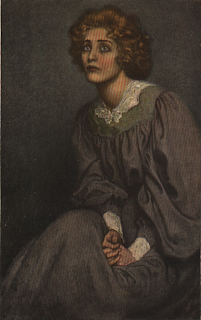
No, I’m not. Very superstitious, that is. (the picture is a cover of a book entitled Friday The Thirteenth, and I thought the woman looked suitably frightened.)
Although I do have to admit to a bit of trepidation when Friday the Thirteenth rolls around–I mean, when some just plain old regular days can be so stressful, what about ones that are especially unlucky? (Fear of Friday the Thirteenth is called “paraskevidekatriaphobia.” How cool is that?)
I did a bit of hunting, and found that Friday AND the number 13 are both considered unlucky, which is why the combination is supposed to be lethal.
A newspaper advertisement from 1913 encouraged people to get over their superstitions and embark on the Happiest Time Of Their Life (sarcasm intended):
WED FREE FRIDAY THE 13TH
Pastor’s Offer to Any Young Couple
Willing to Take the Chance.
MIDDLETOWN, N.Y., June 10 — Any young couple bent on matrimony may have the ceremony performed free next Friday by applying to the Rev. Charles H. Reynolds, pastor of the North Congregational Church.
Mr. Reynolds does not believe that Friday is unlucky, nor that Friday, June 13, 1913, is unlucky, and therefore he offers to tie the knot free of charge for any young couple who comes to him on that day.
Imagine if you did that, what kind of courage you would have? I am not sure I would be so bold.
The only bad thing that’s happened today is that I forgot this was my day to post, but that was soon rectified. Of course, it’s always early–coffee could be banned, Clive Owen could mention he hates people who mention him constantly in their blog posts (not to mention have them as their screensaver), maybe wearing the color black all the time would suddenly be linked to being secretly snarky–oops.
Anyway, what superstitions do you have? How are you doing today?







